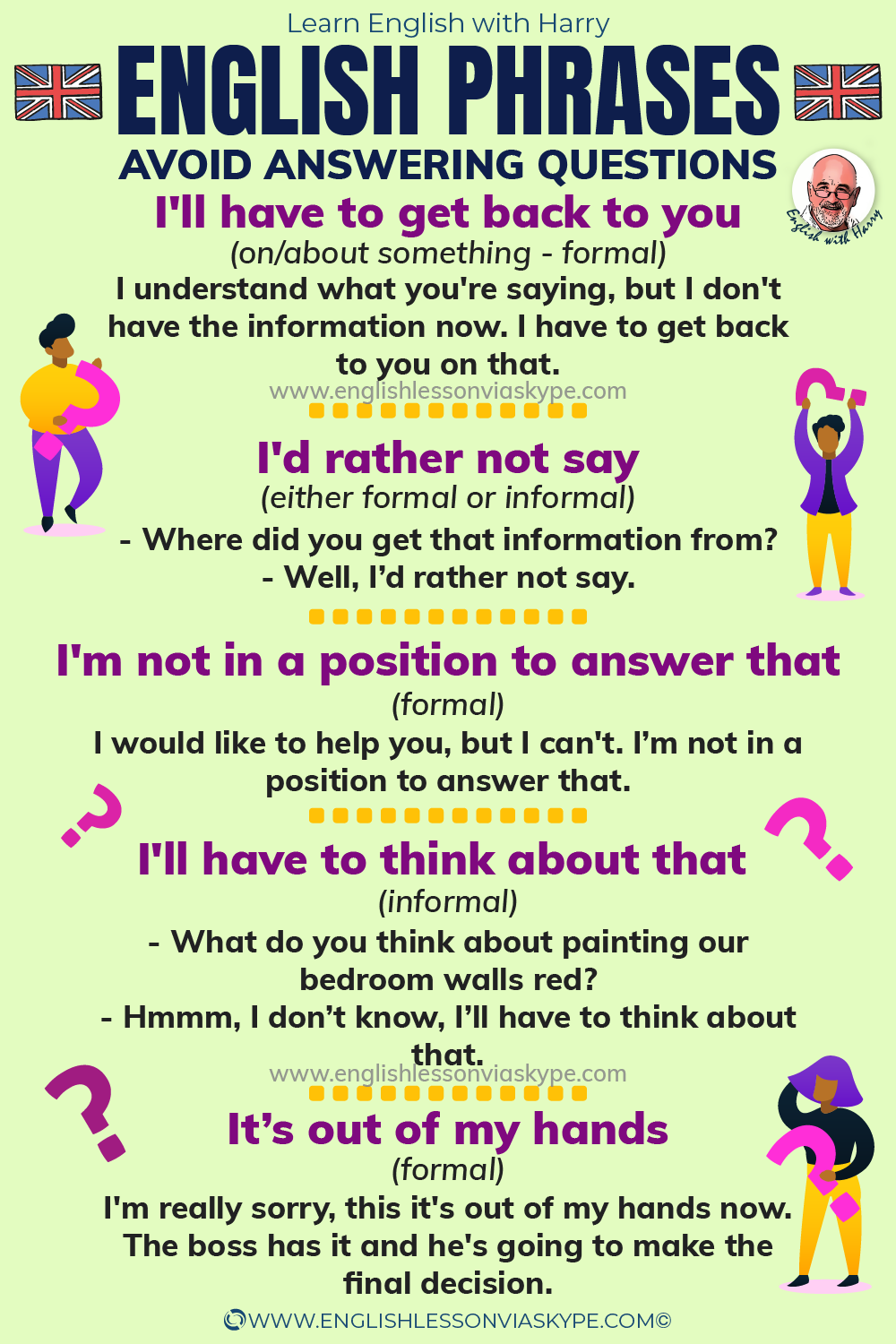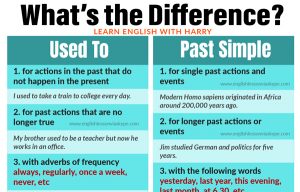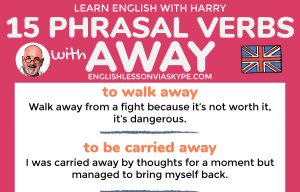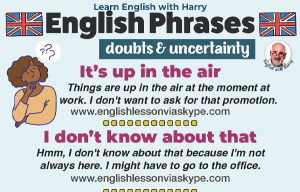Here you’re going to learn useful English phrases to avoid answering a question.
These English phrases will help you when dealing with nosy people, or you don’t want to answer that particular question.
Learn how to avoid giving a direct answer and be confident in English speaking.
Speak better English with Harry - Episode 264
Smart English phrases

Harry
Harry is a native English teacher with over 10 years of experience both online and in face-to-face lessons. With his extensive experience in business, he specialises in Business English but happily teaches ESL students with any English learning needs.
Phrases to avoid answering a question

Hi, there this is Harry. Welcome back to my English learning podcast Speak Better English with Harry. Here I try to help you to get a better understanding of the English language. I help you improve your conversational English, business English.
We look at grammar, phrasal verbs and other expressions.
Today, we’re going to look at some particular expressions and phrases that you might like to use in your English speaking.
So in this particular podcast episode, we’re going to talk about English phrases to avoid answering a question. For example, if you’re in a situation where you want to avoid giving a direct answer.
Intermediate to Advanced English Marathon

INSANITY: doing the same thing over and over again and expecting different results.
Albert Einstein
- What you'll learn:
- better understanding of more complex grammar structures
- advanced English vocabulary words
- British & American slang
- perfect your listening skills through practing different accents
- This marathon is for you if you're:
- stuck at an intermediate English level
- tired of confusing explanations
- a mature student
- shy & introverted
It’s very good for politicians. They love avoiding a direct answer. Other people also try to avoid giving a direct answer when they don’t have the information and they really want to answer.
Let’s start with the first one
I’ll have to get back to you (on/about something)
This is a very typical way of avoiding a direct answer. Here you’re really playing for time. You’re trying to avoid either not wanting to give the person the answer or having to scramble around and try to find the information.
Example:
You get a call from a customer, and they want to know when the delivery is going to take place. They’re putting you under a bit of pressure. So you would say, ‘I understand what you’re saying, but I don’t have the information now. I have to get back to you on that’.
I can’t give you an answer right now
You can use this phrase when you want to play for time.
You’re not in a position to give the person an answer right now because either you don’t have the information or perhaps you don’t have permission to give them the answer that they are looking for.
Example:
I know the question, but I can’t give you an answer right now. I’m going to have to come back to you.
Phrases to avoid answering a question

Share and help other students to improve English language skills.
Phrases to avoid answering a question
I’d rather not say
This phrase might be something you can use from a personal point of view. Usually, we use it when we want to make use of the information you have received without disclosing somebody’s details.
Examples:
👩🦰 Where did you get that information from?
👧 Well, I’d rather not say.
👨💼 I appreciate your coming to talk to me, and I appreciate that you’ve given me an advanced notice about this. Can you tell me who you’ve received the offer from?
👩💼 I’d rather not say.
Next is
I’m not in a position to answer that
This is a very very direct way of responding to, perhaps, a question from somebody in the newspapers or social media who are asking for some particular information that he believes you have. Maybe in connection with your company or a competitor, and they ask you directly to confirm some information.
Examples:
I’m not in a position to answer that. It’s not my responsibility to give you that information.
I would like to help you, but I can’t. I’m not in a position to answer that. This is very delicate sensitive information.
You might add I’m not in a position to answer that right now and you might be able to give them some information later on.
Phrases to avoid answering a question
I’ll have to think about that
We can use this phrase in many many different situations. We usually use it in informal English when we’re not sure about something. This phrase will buy a little bit of time when you want to think about something before you give a definite ‘yes’ or a definite ‘no’.
Example:
👩🏻🦱 What do you think about painting our bedroom walls red?
👱 Hmmm, I don’t know, I’ll have to think about that.
it’s out of my hands
When we use this expression it really means that you have no control over the situation, you can’t influence the situation to any extent.
Examples:
I’m really sorry, this it’s out of my hands now. The boss has it and he’s going to make the final decision.
I tried my best but somehow the boss found out before I could make a decision, so it’s out of my hands now.
If we want to avoid pressure a little bit, we can just you simply use the expression
I’m a bit busy at the moment
You can use this phrase as an excuse if you don’t want to give an immediate answer, or you don’t want to make a quick decision. Of course, it might also be true that you’re working hard at the moment.
Example:
I’m a bit busy at the moment. Can you leave it and ask your mum to help you when she’s back?
book your trial English Lesson
Phrases to avoid answering a question
I can’t say for certain
Meaning: you don’t actually know but you really prefer not to give a definite answer so you’re a little bit indefinite.
Example:
I can’t say for certain when I’d be finished with this project.
I can’t say for certain because I’m waiting for the accounts department to come back to me.
I can’t say for certain what happened because I wasn’t looking. I was just walking along the street and I heard a bang.
For example, somebody might be asking you to be a witness to a traffic accident and you don’t want to get involved or quite literally you didn’t really see what happened because you were looking the other way or you were on your phone. So it’s another way of avoiding the answer.
I’ll let you know
Meaning: you don’t know the answer immediately, but you want to find out so that they can tell them at a later time. This phrase is more common in everyday English.
Example:
That’s a great question. I am not sure. I’ll let you know if I figure it out.
This phrase is also a sort of soft letdown, particularly in job situations. We often use it when we want to let somebody down without telling them a definite ‘no’.
Example:
Thanks for coming in, thanks for meeting us. It was good to see you. We’ll let you know.
Phrases to avoid answering a question
And then finally
I’ll see what I can do
This phrase is used when somebody doesn’t really want to get involved. Somebody’s not sure that he or she can influence the situation. And even if they could, they might not want to. So it’s the best way to avoid giving a direct answer and buy yourself a little bit of time.
Example:
Press is not allowed during this meeting, but I’ll see what I can do.
I can’t promise I’ll read the report, but I’ll see what I can do.
Let me just run through those again for you. English phrases to avoid answering a question. Some of the expressions are very obviously business, and some we can use in a personal way.
- I’ll have to get back to you on or about that (business English)
- I can’t give you an answer right now (business English)
- I’d rather not say (either business or personal)
- I’m not in a position to answer (either business or personal)
- I’ll have to think about it (more personal than business)
- It’s out of my hands (business English)
- I’m a bit busy at the moment (either business or personal)
- I just can’t say for certain (either business or personal)
- I’ll let you know (either business or personal)
- I’ll see what I can do (either business or personal)
Here is some useful language you can use when you want to avoid giving direct answers in English.
As always, if you want to contact me, then I’ll give you a very definite direct answer. You can contact me on www.englishlessonviaskype.com Thanks for listening, and please pass it on to your friends.
More information
For more information on English grammar rules, English collocations and English idioms, check out the links below:
Words and phrases related to RELOCATION
Difference between Ordinary, Common and Usual
Plenty of intermediate and advanced English learning materials are available at Learning English with the BBC.
You will love these English lessons

Used To vs Past Simple – Learn the Difference
Used to vs Past Simple. Many of my students often have difficulties understanding when to use ‘used to’ construction. In


15 Phrasal Verbs with Away
Here you will learn 15 Phrasal Verbs with Away. Let’s kick off with a short video lesson where you will


Express Doubts And Uncertainty In English
Learn to express doubts and uncertainty in English. Learn common English phrases for daily conversation. This is the best place